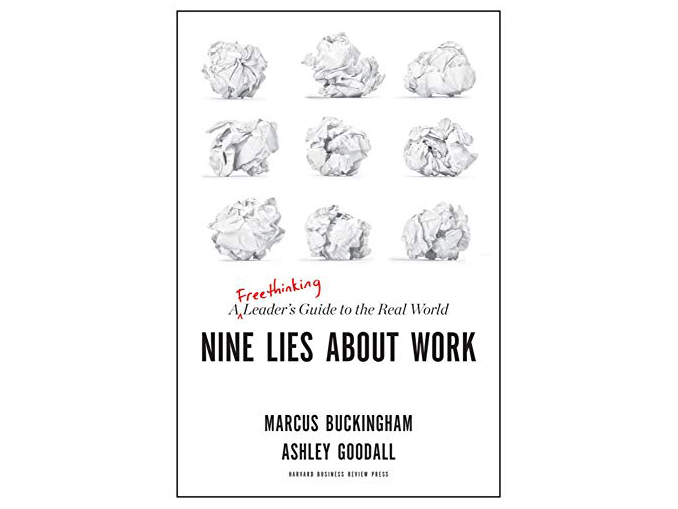Nine Lies About Work: A Freethinking Leader’s Guide to the Real World by Marcus Buckingham and Ashley Goodall, Harvard Business Review, 2019
The genesis of Nine Lies About Work was a research-based article about performance appraisals for Harvard Business Review, which was then leveraged into a book focused on “how humans really work.” The authors, Marcus Buckingham, a business consultant, and Ashley Goodall, head of Cisco leadership and team intelligence, outline nine lies that they believe cause “dysfunction and frustration, resulting in workplaces that are a pale shadow of what they could be.”
The research, conducted in July 2018, was a nineteen-country study of the world’s workforce to identify the conditions at work that are most likely to attract and keep talented employees. Their research found that less than 20 percent of employees feel fully engaged.
This book is well-written and highlights many interesting stories of recognizable companies to support the concepts of the nine lies. However, I believe a major weakness of the book is that the stories they tell focus entirely on one company demographic—very large companies and multi-faceted teams—probably because the authors personally work in this space. I found this limited focus off-putting because so many businesses are much smaller and don’t have to deal with the layers of workplace human drama described in the book.
The nine lies are organized by the following chapters.
- The first three chapters focus on company culture and teamwork.
- The next four chapters address particular aspects of our human nature as employees.
- The eighth chapter questions the notion of needing work-life balance.
- The ninth chapter forces the reader to rethink the concept of leadership and what it really means.
While I don’t agree with all of their rationale across the nine lies, I did find the book to be thought-provoking; it challenged my thinking regarding workplace and employee management, which a good book should do.
I sometimes wondered if by trying to make their point come to life, they stretched too far with their ideas, several of which I don’t believe are realistic. As a strategic planner and market researcher, the first three lies are where I struggled the most with buying their rationale. Granted, while many companies do not productively work their business plans or cascade goals effectively, a company does need to provide more than a “vision” and hope that teams of employees move in the right direction. It’s not that simple; human beings bring personal biases, attitudes, and perceptions into the workplace. I believe employees need to be guided down the appropriate path for “the business” with a strong strategic plan, and can still work in an environment that promotes employee engagement.
Always striving to be an innovative thinker, I do believe that the middle chapters, which focused on employees, resonated for me. They emphasized that every individual is unique and should focus on building their strengths. Employees want to provide value to their employer and to do so, they want more than feedback; they need attention to thrive. However, while they throw the 360 degrees review process out the window, for justifiable reasons, I believe they went too far by advocating for the elimination of performance reviews, and saying we should all rate ourselves instead. I think society’s over-emphasis on placating the Millennial and Gen Z generations has created this new wave of thinking that hierarchy and structure no longer matter, that experience and excellent performance no longer matter. I don’t buy it, and I predict it’s going to come back around.
I think if you like reading about leadership and employee management, you might want to consider this book, as it will challenge your attitudes on the topic, and you’ll enjoy the real company stories shared. However, I think this book is targeted to only those who work in big corporations, and it’s just not relevant for sole proprietors or those who work in small businesses with a smaller number of employees.


Be the first to comment